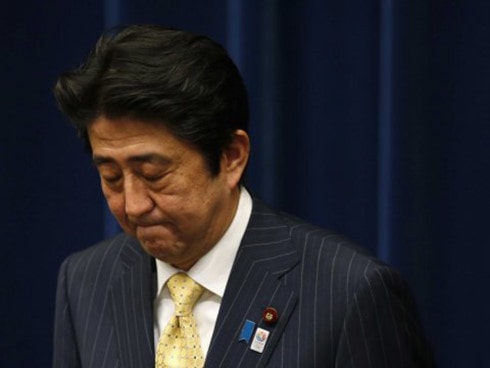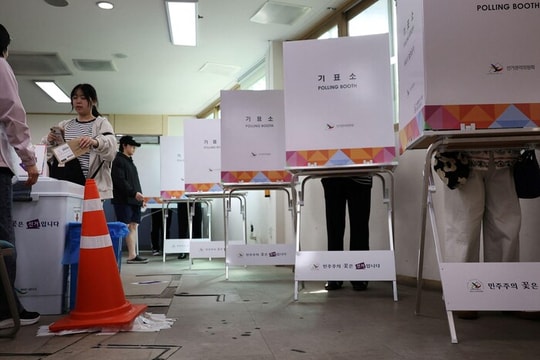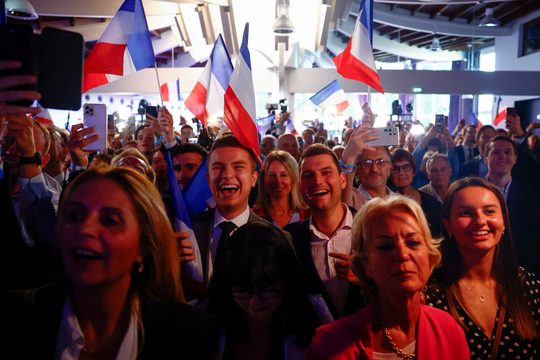The price Japan's Prime Minister must pay for constitutional reform
Japanese Prime Minister Shinzo Abe's popularity has suddenly plummeted after he called for early elections, the main purpose of which is believed to be to change the Constitution.
Realizing that the Japanese people are worried about defense in the face of the tense situation on the Korean Peninsula, and at the same time that the support rate for the ruling Liberal Democratic Party (LDP) is at a high level, Japanese Prime Minister Shinzo Abe recently announced the dissolution of the House of Representatives, calling for an early election in the hope of winning "like a bamboo split" and controlling at least 2/3 of the seats, opening the way to amend the pacifist Constitution, the core of which is the provision regulating Japan's right to self-defense.
However, things are not going as he planned.
 |
| Japanese Prime Minister Shinzo Abe. Photo: Reuters |
According to a poll released by Kyodo News on October 1, 46.2% of respondents said they do not support Prime Minister Shinzo Abe's administration, while the number of voters who support him is 40.6%. In addition, 24.1% said they would vote for Shinzo Abe's ruling Liberal Democratic Party (LDP), while 14.8% voted for the Party of Hope (PH), which was recently founded by Tokyo Governor Yuriko Koike.
According to observers, this move by the Japanese Prime Minister carries many more risks than that and Shinzo Abe may have to pay a high price for his "obsession" with changing the Constitution.
Why is Mr. Abe always concerned about changing the Constitution?
Revising the pacifist Constitution has always been a top priority for Japanese Prime Minister Shinzo Abe. Prime Minister Abe has focused on revising Article 9 of the Constitution to allow Japan to exercise the right to collective self-defense. This is important to Prime Minister Abe because he believes that the current provisions still raise questions about the constitutionality of the Japan Self-Defense Forces (SDF) and the types of activities the SDF is allowed to engage in.
By renouncing the right to go to war and prohibiting Japan from establishing land, sea, and air forces as well as other war potentials, Article 9 of the Japanese Constitution acts as a “golden ring” that restricts the government’s ability to use the SDF. And so, every move of the SDF, whether at home or abroad, becomes a subject of fierce debate in Japan.
Such debates become particularly fraught when they involve issues surrounding Japan’s self-imposed ban on the exercise of the right of collective self-defense. Put simply, a country’s right to collective self-defense is the privilege of a country to consider that “an attack on one is an attack on all” of its allies, and that these countries have the right to respond appropriately, including the use of force.
Because the Japanese government has long believed that the country has the right to collective self-defense but has not been able to exercise that right, the ability to deploy the SDF together with the armies of other countries has become extremely limited.
Prime Minister Abe, therefore, has a strong determination to review Article 9 of the Japanese Constitution to allow the SDF more flexibility in all activities, including relaxing the current strict ban on exercising the right of collective self-defense.
10 years of struggling to find a way to change the Constitution
When he first became prime minister in 2006-2007, Mr. Abe set up an advisory committee – commonly known as the Yanai Committee – to propose “four scenarios” under which Japan would be allowed to exercise the right of collective self-defense. But Mr. Abe had to resign by the time the committee made its provisional recommendation in April 2008, and his successors have not taken any further action on the issue.
Not giving up, Mr. Abe raised the issue again when he returned to power in December 2012. In his first press conference, when asked about revising the Constitution, Mr. Abe then brought up the recommendations made by the Yanai Commission in 2008 and expressed his desire to review the issue with new momentum.
Since then, Mr. Abe has moved decisively and quickly to push for a revision of Japan’s pacifist Constitution. The Yanai Commission released its final report in May 2014 and recommended that Japan’s ban on exercising the right to collective self-defense be lifted.
In response, the Abe administration issued a Cabinet decision that Japan could exercise the right to collective self-defense in limited circumstances. The Abe government also pushed through the Peace and Security Legislation, which expanded the scope of activities the SDF could conduct, and took effect in March 2016.
However, Mr Abe's fervent desire to revise Japan's pacifist Constitution comes at a price.
Mr. Abe and the Constitutional "gamble"
The most obvious cost is that Mr. Abe's focus on this issue has overshadowed other domestic issues.
From economic recovery to tax reform, pension reform, care for the elderly and promoting gender equality, including support for dual-wage earners, Mr. Abe has put forward a series of extremely “attractive” initiatives. But the specific practical results are less recognized.
The cost is less obvious but more important is the approach Mr Abe has chosen to push his agenda.
Mr. Abe’s use of the ruling LDP-Komeito coalition’s majority to push through controversial bills, including the Peace and Security Act, has only hardened the stance of opposition parties. As a result, the debate on national security in Japan’s lower house has become a war of words between the two sides over what is legal or illegal, while neglecting other fundamental issues.
Issues such as how far Japan would be willing to go in increasing SDF deployments to achieve its national security goals, or how elected leaders could maintain civilian control of the SDF while ensuring that the force remains politically neutral, were not thoroughly discussed in Japan's lower house.
Unless Mr Abe makes major changes in approach when his government presents its draft proposal to revise the Constitution, it will be difficult to have productive debate on any of the above issues.
Even if Mr. Abe does change Japan's Constitution, the lack of consensus on how the country will use the SDF, deep political divisions on the issue will continue while there is a lack of debate to resolve those issues in the Lower House./.
According to VOV
| RELATED NEWS |
|---|




